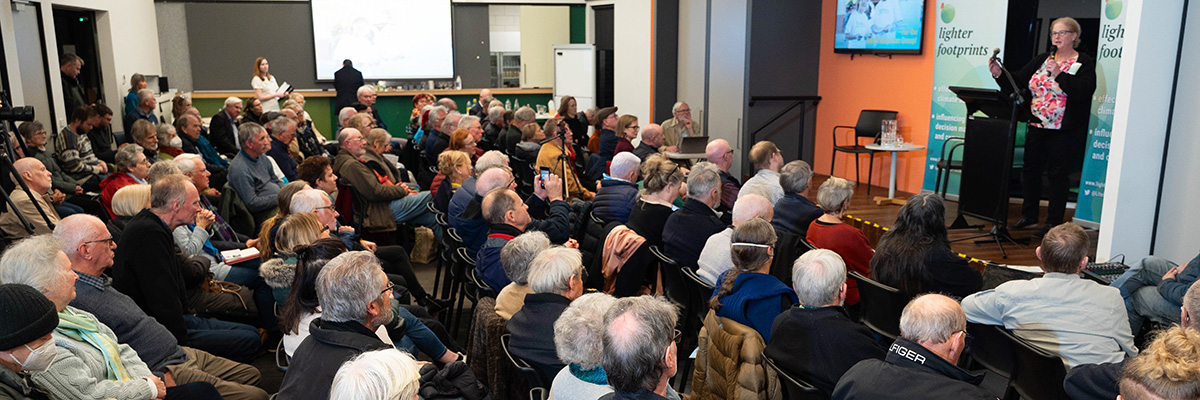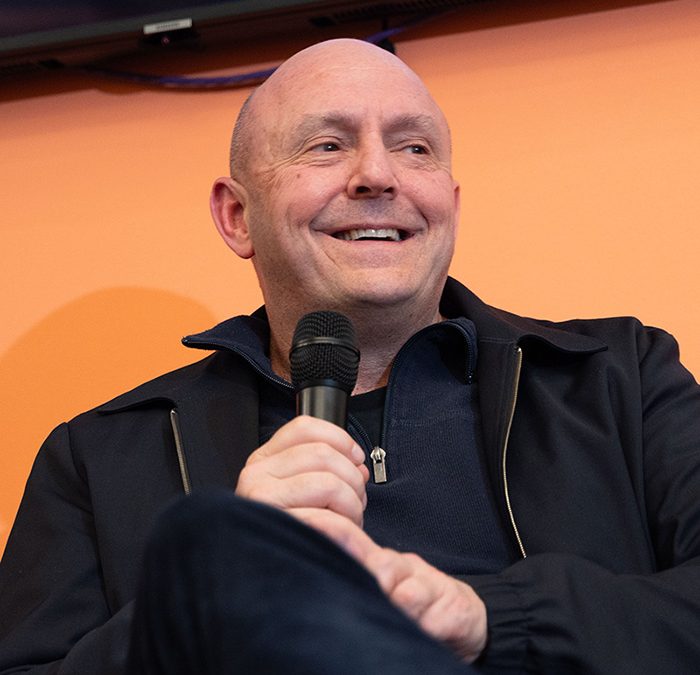The Macroeconomics of Australia’s Energy Transition:
Wednesday 19 June, 2024 at the Balwyn Park Centre
There was a full house of over 150 attendees to hear Richard Denniss, Executive Director of the Australia Institute, in conversation with Heidi Lee CEO of Beyond Zero Emissions. You can watch the event again on our YouTube channel here.
Richard opened his remarks by stating that economics is about how the things we do interact with other things we do and that the energy transition has been over complicated, and is not the most complicated nor difficult transition Australia has undergone.
Three big ideas!
He had three ideas that some would think of as being contentious:
- Tackling climate change is not that hard
- Tackling climate change is not that expensive
- Tackling climate change is not the biggest challenge Australia has faced

Richard Denniss and Heidi Lee challenge the audience to raise their expectations on the clean energy transition
Transition is inevitable
Other sectors of the Australian economy have undergone transitions and there were tens of thousands of jobs lost.
Examples include:
- Smart phones and the loss of photo development from film
- The loss of the textile and footwear industries when tariffs were removed, jobs lost especially affected women in rural Australia
- The loss of the car manufacturing industry
Richard reminded us that workers lost their jobs in the Australian textile, footwear and car industries. He suggested that while fossil fuel companies profess concern for the ongoing employment of their workers, their main concern is to continue to make money from fossil fuel mining.
He explained that economies are in a permanent state of flux and that the Australian economy will change a lot over the next twenty years.
There is no excuse for not getting on with it
The question to answer is will we tackle climate change, not will the economy change. The fossil fuel industry is using a scare campaign to make us think that the energy transition is bigger, harder and more complicated than the reality of the task.
Richard amused and engaged the audience with some of his facts and figures;
- There are more people giving dogs hair cuts than the 21,000 people who work in the gas industry
- 50,000 people work in the coal and gas industry, 100,000 work for Mac Donalds in Australia
- < 1% of Australians work in the the fossil fuel energy system
However, the audience had strong reactions to some of the other stats and word pictures from Richard.
Are fossil fuels really that critical?
We are told that the fossil fuel industry is the backbone of our economy, so are other countries without a fossil fuel industry spineless?
Australia’s economy is the 13th or 14th biggest economy in the world, yet MacDonald’s employs more people than the gas industry.
Australia is a continent of resources, largest exporter of LNG, iron ore and soon of rare earths yet we do not feel rich. The Russians are better at gaining wealth from their resources than we are, other countries tax the hell out of their fossil fuel industries, for instance, Norway with its massive sovereign wealth fund and free tertiary education system.
Richard spoke about Australia’s gas industry:
- In the 2021-22 budget period, the total fossil fuel subsidies from federal and state governments’were approx $11.1 bn, now its up to $14.5bn
- Prior to 2016 there was no significant export of gas by Australia
- No royalties are paid on over half the gas exported from Australia
- Exxon is yet to pay any company tax to Australia
Japan is a major investor in our gas export facilities, Australia allows Japanese oil and gas giant INPEX to have near free Australian gas that Japan then onsells to other countries.
The gas industry threatens that if Australia taxes them they will stop building new gas extraction and export facilities, (that would help combat climate change)!
- Why have we built (and continue to build) gas processing plants on the Burrup Peninsula where there is a world-significant 40,000 year old outdoor Aboriginal rock art gallery threatened by acidic emissions?
- Why is the federal government giving a 1.5 bn subsidy to build the Middle Arm petrochemical hub? The report of the Middle Arm Senate Inquiry is due to be released in August. See a map of the proposed Middle Arm development here.
Richard emphasised that the gas industry is bluffing us about Australia’s risk of breaching gas export contracts, it is not our risk, it is the companies’ risk. He reminded us of what Josh Frydenberg said when asked about the $250bn cost of nuclear submarines.
‘’ Everything is affordable if it’s a priority. This is a priority.”
Josh Frydenberg
In Conversation with Heidi Lee, BZE
Heidi Lee, CEO of Beyond Zero Emissions, had a conversation with Richard incorporating audience questions. Heidi highlighted the importance of engaging with coal mining and power station communities and advocating for and assisting those communities to have alternative employment opportunities.

Richard Denniss and Heidi Lee discuss Australia’s clean energy transition and the potential of clean manufacturing
Just transition
Heidi and Richard mentioned that the main job in a coal mine is driving trucks and the mining industry is automating as fast as it can eg robotrucks. Will the mining companies ban robotrucks to protect their workers?
They mentioned we are still developing coal mines in new areas, offering jobs to workers which will mostly be automated in the near future.
Other memorable lines from their conversation were:
- Why is there more concern expressed by community members in the Illawarra about seeing wind turbines on the horizon than an ugly steel works in Port Kembla?
- Reason – vested interests are being manipulative and hypocritical to create division within communities about renewable projects
Transmission Lines
Another example was transmission lines. Farmers do not like coal mining nor fracking but it is their concern about transmission lines that is being heard and used by the Conservative side of politics to stymie projects and create division.
Take home messages
Richard’s take home messages to the audience about the energy transition were;
- It is not that complicated.
- We can afford to do it.
- We have spent 30 years moving towards renewables too slowly
- We need to stop fossil fuel subsidies
- We need to stop approving and building new fossil fuel projects
- If we do not like what the politicians are doing vote them out

Lynn Frankes concludes the meeting with invitations to join campaigns to elect climate friendly councillors, help the Kew Rec Centre go electric and save our trees
More Information
The Australia Institute
- Myth 1 – Gas has an “important role”: The Australian Government has defended the “important role” of gas, offered $1.5bn to the Middle Arm gas terminal and and keeps expanding coal and gas. But “Limiting global warming to 1.5˚C requires rapid decarbonisation, and the prevention of all new fossil fuel projects – including gas – in favour of truly zero-emissions energy.”
- Myth 2 – Gas creates jobs. But gas creats few jobs. Australians think coal and gas employ 10% of the workforce, but in fact “gas and oil extraction employs around 21,200 workers – just 0.15% of the 14 million people employed in Australia.”
- Myth 3 – Gas brings in a lot of money. But relatively speaking, gas brings in little money. Australians think oil and gas contribute 12% of GDP, but “the real number is actually 2.5%”. Source: The Australia Institute
- “56% of gas exported from Australia attracts zero royalty payments”.
- “multinational companies made $149 billion exporting gas they got for free.”
- “If royalties had been charged on this gas, at least $13.3 billion in revenue could have been raised and used to increase living standards of Australians by funding schools, hospitals, renewable energy, and other needed public infrastructure”
- Watch the video here
Fossil fuel subsidies hit $14.5 billion in 2023-24, up 31%
- Australian governments enabled $14.5 billion in subsidies to fossil fuel producers and major consumers in 2023-24
- equivalent to “$27,581 for every minute of every day“
- “$540 for every person in Australia“
- “state and federal governments are budgeting for more fossil fuel use and more fossil fuel production, not less,”: Rod Campbell, Research Director at the Australia Institute. Source: The Australia Institute
Beyond Zero Emissions
Make it Here: Building Australia’s Clean Industrial Future
Research by BZE finds that
- $215 billion in cumulative revenue with a clean energy and clean manufacturing transition
- Up to 53,000 additional ongoing jobs by 2035
could be created if Australia takes bold action to boost Australian manufacturing capabilities and grow five onshore cleantech supply chains.

